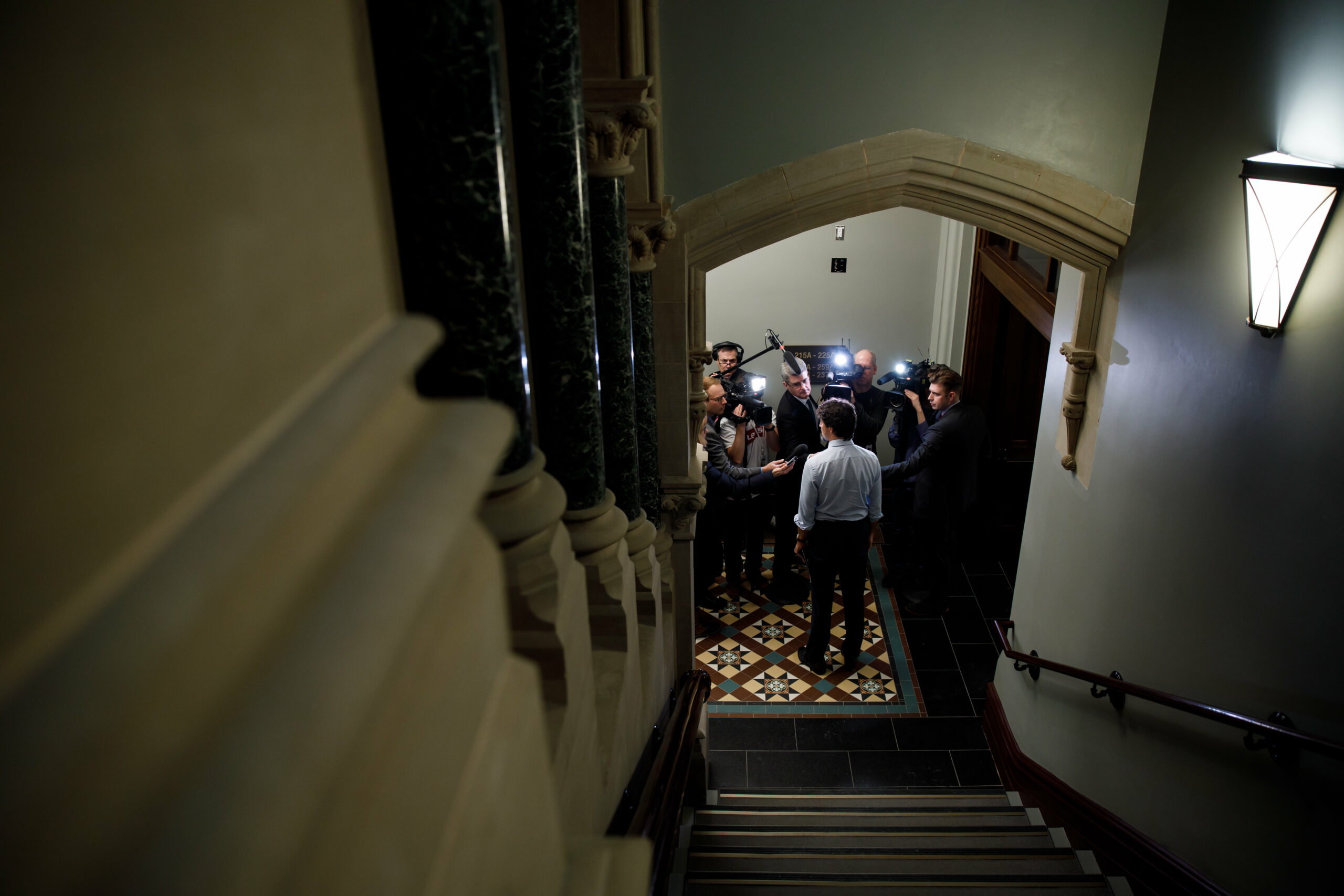
Alberta oil and gas companies could avoid cleanup costs by installing solar panels: government report
An Alberta government-commissioned report suggests oil and gas site companies may be able to install...
Political fundraisers and campaigners who help politicians get elected may soon be able to lobby those same politicians during their term in office, under a proposal from a federal watchdog to update lobbying rules in Canada.
Under existing rules, any lobbyist who becomes a major fundraiser or senior political organizer is not allowed to lobby any elected politician they’ve assisted for about four years or the duration of that government’s term in office. This restriction was introduced to prevent political operatives who work in the private sector from using their government connections to get ahead.
Changes proposed by Nancy Bélanger, the federal lobbying commissioner, would allow lobbyists who become full-time political campaigners and fundraisers to lobby those same politicians sooner: a year after their election. If they take on a leadership role, like serving as a campaign manager, the waiting period would be two years.
Bélanger has said the changes are meant to clarify the rules, and strike a balance between guarding against conflicts of interest and impairing lobbyists’ constitutional right to participate in elections.
Critics, however, say Bélanger’s proposed shortening of the “cooling-off period” — the period of time before a lobbyist can lobby their former political boss — would create an unfair advantage for powerful corporate interests such as the fossil fuel industry, and contribute to growing levels of public distrust in Canada’s democratic institutions.
“Reducing the current cooling-off period from four years to as little as one year will create a possible scenario where someone goes from fundraising for a candidate to lobbying the same minister, within the same term of office,” NDP ethics critic Matthew Green told The Narwhal.
“I think this change would only serve to increase a growing cynicism around the revolving door between corporations, lobbyists and political parties.”
Green, a member of the House of Commons ethics committee, moved a motion in December to delay the rollout of Bélanger’s new rules until she can appear before the committee and explain her changes.
The House is adjourned and returns late January, after which the committee is expected to schedule Bélanger’s appearance.
Green said that when the committee returns, he hopes members can hear from the commissioner as well as other “subject matter experts” on how to “best ensure that Canada has the gold standard when it comes to having clear, effective and transparent rules around lobbying.”

James Turk managed several successful campaigns in the 1970s and 1980s, including for former longtime Toronto city councillor Joe Pantalone, as well as a number of provincial politicians and school trustees. He said the new rules could have helped a political organizer like him unduly influence a politician after an election.
“I know the person well, I know their idiosyncrasies,” said Turk, who is now director of the Centre for Free Expression at Toronto Metropolitan University. “There’s all sorts of ways I can … try to shape decisions that that person would make.”
Turk said allowing this type of lobbying by senior political operatives would be “wholly inappropriate” and not in the public interest.
The centre is one of 14 organizations representing civil liberties, freedom of expression and climate action that signed an open letter opposing some of Bélanger’s changes.
Any amount of fundraising or campaigning for a politician, the groups say, should be seen as a big favour that creates an appearance of a conflict of interest lasting for years — arguably, they say, over that politician’s entire career.
Lobbyists, meanwhile, say that even though it’s common for political strategist types to switch back-and-forth between election organizing or fundraising and consulting or lobbying, they are unlikely to take advantage of the new rules in great numbers in the way Green and Turk have proposed.
Getting involved in political work is inherently risky for lobbyists because governments can change, and a lobbyist’s political opinion might wind up offending a new minister or official, according to Kevin Bosch, a managing partner at Ottawa-based public affairs firm Sandstone Group.
Bosch has previously been a research director for Liberal members of Parliament and worked in Liberal Party of Canada headquarters. He has also registered to lobby for clients such as Amazon and the Canadian Nuclear Association.
He said when people like him become lobbyists, they tend to pull back from political activity out of their own desire to self-censor.
“I think all the current lobbyists I know, they kind of know, ‘Well, I can’t go take on that role’,” said Bosch, who also recently worked with the Government Relations Institute of Canada, a diverse industry group that includes fossil fuel firms, public relations firms and some large Canadian banks and corporations.
“I don’t expect there will be people trying to game the system because there’s just not a lot happening now,” he said.
It would also involve a lot of luck for a lobbyist to correctly identify and work for a politician who, two years later, winds up overseeing the particular area of government that aligns with the interests of the company paying that lobbyist to represent them, Bosch argued.
“You’d have to do a lot of guessing: ‘Okay, I’ll be the campaign manager for this person, because I think they’re going to be in cabinet’ — which may or may not happen — and, ‘I think they’re going to be in a cabinet position that could affect me,’ if you’re trying to get the natural resources minister or something … it’s very hard to know.”
Bosch said he was fine with Bélanger’s proposed two-year cooling-off period for strategic political work, describing it as a “reasonable system,” but felt the one-year ban for other types of activity could dissuade people from getting involved in politics.
The institute’s views are supported by other big firms like Suncor Energy, which pushed the commissioner in its own submission to drop restrictions on lobbyists who help out campaigns “if only to allow people to be involved in the democratic process of an election.”
Suncor told Bélanger it believed lobbyists should not have to face a ban on lobbying if their political activity was not significant enough to warrant a two-year cooling-off period. The company did not respond to requests for comment from The Narwhal.

According to the commissioner’s most recent annual report, over 8,000 lobbyists registered at least once during the 2021-22 fiscal year, representing over 3,000 organizations and corporations.
Lobbyists filed nearly 10,000 records of contact with MPs that year, and over 8,000 more with ministers, senators and public servants.
The law governing federal lobbyists in Canada is the Lobbying Act, which says the commissioner must develop a “Lobbyists’ Code of Conduct,” but does not specify exactly what it should include.
The current version of that code dates to 2015, and is similarly sparse, at two pages, not including the preamble. Finally, there is a separate “guidance” document that clarifies how the code should be interpreted.
Bélanger is proposing to update the code by changing some of the 2015 elements, as well as bringing in new information, such as rules around political work, that are currently only covered in the guidance document.
Bélanger’s new code would include a two-year cooling-off period for lobbyists who conduct high-profile work for politicians or political parties, like serving as a campaign manager or in another leadership position, serving on the executive of a riding association or organizing fundraisers or campaign events.
A second category for “other political work” would carry a one-year lobbying ban in the updated code, such as lobbyists asking for donations to politicians’ campaigns, handing out campaign materials, conducting political research or handling logistics for campaign events.
However, this year-long ban would only apply if the lobbyist did that work on “a full-time or near-full-time basis,” or had frequent or extensive interaction with the candidate.
A third proposed category of political activity would not result in any bans on lobbying. This could include “attending a fundraising or campaign event” (but not organizing one or fundraising full time), posting campaign material during an election or making political donations.
“These definitions work to provide a lobbyist with a clear and precise sense of how the rule applies to their circumstances,” she wrote in her proposal.
Her office also argued to The Narwhal that the new code avoids overreach, especially since the commissioner would also have the power under the new rule to reduce the cooling-off period herself.
“The ability to reduce the cooling-off period allows an analysis, on a case-by-case basis, in circumstances where the duration or the importance of the work may not warrant the applicable cooling-off period,” Bélanger’s spokesperson wrote in an email.
Bosch also helped write the institute’s submission to the commissioner, arguing limits on lobbying imposed as a result of political activity could violate constitutional rights.
The group’s key argument rests on the voting rights section of the Charter of Rights and Freedoms, which has been interpreted by the Supreme Court of Canada as going beyond the election of a particular government to also include “the right of each citizen to play a meaningful role in the electoral process.”
Bélanger has also acknowledged her changes come after concerns raised by “several stakeholders” that “keeping a rule related to political engagement in the code could infringe a lobbyist’s Charter rights.”
The commissioner sought a legal opinion from an outside law firm on the political work of lobbyists following her most recent consultations in June 2022, the spokesperson confirmed to The Narwhal.
In her proposal, she described the new rules as “carefully crafted to respect Charter-protected rights and freedoms.”
The name of the law firm is being kept under wraps, with Bélanger’s office citing solicitor-client privilege.
The Narwhal asked how Bélanger’s office selected the law firm, including whether it had verified if any lawyers at the firm were also working for one of the companies or industry associations who made submissions during the commissioner’s consultations. The spokesperson said the firm was picked “based on its administrative law expertise and that it is not subject to the Lobbying Act.”
The spokesperson also said the law firm “ran a conflict of interest screen” when it was retained.

Despite the proposal being more fine-tuned than the current rules, Bélanger’s changes could result in closer relationships between oil and gas lobbyists and federal government officials, according to Kai Nagata, energy and democracy director at the Victoria, B.C.-based advocacy group Dogwood. Lobbyists for the oil and gas industry are already registering over 100 communications a month.
The group, which signed the open letter along with Turk’s centre, does political organizing and campaigning on issues and during elections but says that it does not lobby federal politicians.
Nagata said there is a “growing corporate influence” that is “chewing away at the last shreds of trust” Canadians have in their politicians, and the new rules won’t help. He said tighter rules were “worth it for public interest groups, if they curtail the money and influence of the corporate sector.”
“We need more distance between oil and gas lobbyists and politicians, not less,” he said.
“The proposed changes to the lobbyists’ code of conduct would allow them to literally get politicians elected, and then turn around and lobby them on behalf of corporate clients. Public officials can’t make fair decisions in the public interest if they owe their job to powerful lobbyists.”
The groups want Bélanger to extend the cooling-off period for lobbyists doing political work to five or 10 years instead.
And they believe all political activity — aside from very basic actions undertaken by many voters during elections, which they describe as “canvassing or volunteering a couple of times during a campaign period” — should be subject to lobbying bans.
When people work in high-profile positions in political campaigns, like becoming a campaign manager, they are essentially in control of everything the politician does, Turk said, and are seen as essential to that politician getting elected.
“So if I can turn up a year later, or two years later and say, ‘Well, John, I want to talk to you about the importance of you passing this piece of legislation,’ I have the kind of relationship with the now-prime minister, or cabinet minister or opposition leader that few people in the country would have,” he said.
“I’m profiting from that personal relationship I developed working for him, by making money as a lobbyist to then push him, and he’s going to feel obligated to me in ways that he wouldn’t feel obligated to a person that had no involvement.”
Bélanger’s special rule for lobbyists doing “near full-time” political work was also questioned by Ottawa-based nonprofit Democracy Watch, which wrote the open letter, in December 2022.
Adding to concerns over political rules, the Canadian Labour Congress, an umbrella organization that represents dozens of labour unions has also expressed doubts about the practicality of another proposal from Bélanger to change lobbying rules regarding gifts and hospitality.
It’s common for organizations to host after-work receptions on or around Parliament Hill, where MPs from all parties, as well as journalists and corporate executives often mingle with lobbyists, have a glass of wine or eat an appetizer. Lobbyists see receptions as more efficient than having to book individual meetings with multiple MPs.
Offering free food and drinks at a reception can be acceptable as long as the cost is “reasonable,” the current rules say, and there is no specific dollar amount tied to this rule.
Bélanger’s proposal sets the limit for food or drinks offered by lobbyists to officials at in-person meetings, events or receptions at $40 in 2023 dollars, before taxes, tips and other fees like rental or service charges. Lobbyists also can’t offer the same official more than $80 worth of food and drinks within the same year.
“The purpose of the limits on gifts and hospitality is to support equitable access to government regardless of resources,” Bélanger wrote in her proposal. She said she arrived at the $40 limit by considering appropriate federal hospitality standards as well as typical meal costs in restaurants and the impact of inflation.
A lobbyist can also ask the commissioner for an exemption to the limits due to circumstances like regional pricing or dietary requirements.
Canadian Labour Congress president Bea Bruske said there were “no mechanisms for unions to track how much hospitality a public office holder consumes at one of our meetings, receptions, lunches, dinners and events.”
As a result, Bruske said, “we have no way to ensure public office holders don’t exceed the $40 allowed at a single event and never go over $80 in a single year. These clerical items will add significant administrative work to our organizations.”
Green also said he had heard concerns from labour movement officials that the new rules on hospitality “would likely change the manner in which many organizations approach their political advocacy work.”
“I can see a scenario where this could limit the ability of groups to meet with elected officials,” he said.
Content for Apple News or Article only Get the inside scoop on The Narwhal’s environment and climate reporting by signing up for our free newsletter. This...
Continue reading
An Alberta government-commissioned report suggests oil and gas site companies may be able to install...

This story about a lawsuit involving First Nations in northern Ontario has deep roots — in...

At a crucial point in their research, biologists are scrambling to find new support for...

